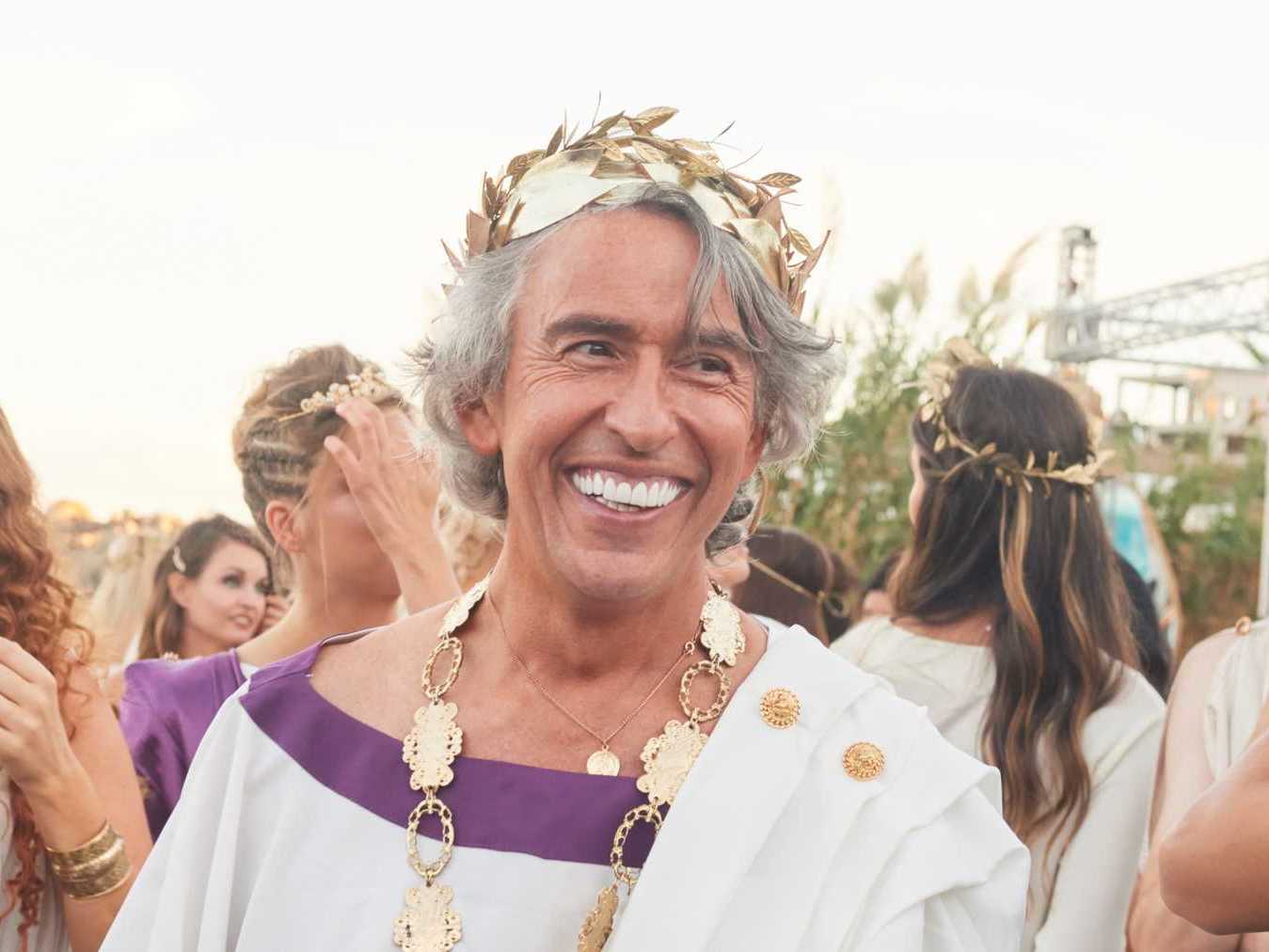“Fashion Favorite! Beyoncé Glitters in Same Golden Gown Keke Palmer Rocked at the VMAs - PEOPLE.com” plus 3 more |
- Fashion Favorite! Beyoncé Glitters in Same Golden Gown Keke Palmer Rocked at the VMAs - PEOPLE.com
- Fans are crazy in love with Beyonce's latest gold dress: 'This is one of her best looks' - USA TODAY
- Beyoncé's Halloween Costumes From Past to Present 2019 - Glamour
- Michael Winterbottom forced to cut ‘potentially damaging’ references to Beyoncé and Jennifer Lopez in new film - The Independent
| Fashion Favorite! Beyoncé Glitters in Same Golden Gown Keke Palmer Rocked at the VMAs - PEOPLE.com Posted: 07 Oct 2019 08:24 AM PDT  this link is to an external site that may or may not meet accessibility guidelines. |
| Posted: 06 Oct 2019 12:08 PM PDT Mathew Knowles, father to Beyoncé and Solange, revealed on "Good Morning America" that he's been battling breast cancer. USA TODAY Beyoncé fans went wild on social media for the superstar's latest look. Arriving Saturday night at the grand opening of Tyler Perry Studios in Atlanta, Beyoncé debuted a shimmering yellow gown by Yousef Aljasmi, paired with Anabela Chan diamond chandelier earrings, strappy sandals, a long braid and a bold, orange-red lip. Queen Bey let the look speak for itself in an Instagram post highlighting the look with no caption and a simple, dark background. But others filled in the blanks in the comments. "Omg," wrote actress Tia Mowry. "A GODDESS," one fan commented. "This is one of her best looks," another chimed in. The red carpet for Perry's studio opening was a star-studded event, and many of Hollywood's biggest names came out to support the filmmaker. Among them: Oprah Winfrey, Spike Lee, Taraji P. Henson, Anita Baker, Ava DuVernay, Samuel L. Jackson, Tiffany Haddish, Viola Davis, Halle Berry, Usher and Whoopi Goldberg, Winfrey praised Perry to The Associated Press: "He didn't wait for other people to validate or to say, 'You should go this way' or that way. He said, 'I'm going to create my own way' and as we can see here, become a force for himself," she said. Contributing: The Associated Press Read or Share this story: https://www.usatoday.com/story/entertainment/celebrities/2019/10/06/see-gorgeous-gold-gown-beyonce-wore-tyler-perry-party/3890927002/ |
| Beyoncé's Halloween Costumes From Past to Present 2019 - Glamour Posted: 07 Oct 2019 11:01 AM PDT  Beyoncé's Halloween costumes make her, without a doubt, one of the undisputed queens of the holiday. The music icon has been serving us look after look every year since 2013, and each costume is better than the last. Heidi Klum is known as Hollywood's biggest Halloween fan, with her costume choices running the gamut each year, but Beyoncé is giving her a run for her money. She may not be in the spooky game as long as Klum has been, but her costumes are just as detailed, intricate, and fun. In fact, I need a museum of Beyoncé Halloween costumes to open up immediately. The world needs to pay proper tribute to these ensembles. So without further ado, let's go through Beyoncé's Halloween costumes through the years. Imitation is the sincerest form of flattery, so feel free to draw inspiration from Queen B for your own Halloween style. It's only a few weeks before we see what she's got planned for 2019. |
| Posted: 07 Oct 2019 02:31 AM PDT  Michael Winterbottom was forced to cut "potentially damaging" references to Beyoncé and Jennifer Lopez in his new film to protect Sony's "corporate relations". Winterbottom's new film Greed is a comic satire starring Steve Coogan as a billionaire inspired by Arcadia Group chairman Sir Philip Green. It originally ended with a series of captions that referenced real-life stars and named billionaires who have profited from factory workers earning low wages in South Asia. However, Winterbottom has now claimed that Laine Kline, head of Sony Pictures International, which co-financed the film and is distributing it worldwide, ordered that the references be removed. Speaking to The Guardian, Winterbottom said: "He was like… We're not going to have mention of individual brands in those cards or individual billionaires. Because we're worried about the potential damage to Sony's corporate relations with these brands." The captions originally referenced by name Stefan Persson, the owner of H&M with a net worth of $18 billion, and Amancio Ortega, the owner of Zara who is worth $67 billion. They additionally stated that factory workers in Myanmar and Bangladesh earn between $3.60 and $2.84 a day making clothes for leading high street fashion brands in the UK. 1/10 Bad Santa (directed by Terry Zwigoff, 2003)The perfect antidote to the usual Christmas slush-fest, Bad Santa has an outrageously profane and debauched Billy Bob Thornton using his seasonal job as a shopping mall Santa Claus to rob the mall's stores. A needy child latches on to him, thawing the misanthropic alcoholic only slightly, but Zwigoff makes no compromises, and leaves no yuletide convention unscathed. One can only guess at how many unsuspecting families have had their festive celebrations scarred after innocently viewing just a smidgen of this disgusting but hilarious monument to bad taste. 2/10 Monsieur Verdoux (Charles Chaplin, 1947)Hugely controversial on release, the hostile reception garnered by Monsieur Verdoux helped precipitate Chaplin's eventual exile to Europe. The years between 1940's The Great Dictator and Chaplin's most polarising film hadn't been kind to Chaplin thanks to scandal in his private life and the increasing perception of his supposed communist sympathies. Chaplin's subsequent feelings of isolation and alienation informed this pitch black tale of a bluebeard who woos and murders a series of wealthy women so that he can support his own family. Chaplin's satirical social commentary and his character's defence that his crimes paled into insignificance in comparison with the horrors of the real world found no favour either at the box office or with critics, and the little tramp's journey from the world's most loved entertainer to public enemy number one was complete. 3/10 The Heartbreak Kid (Elaine May, 1972)Forget the wretched Ben Stiller remake and try and view a (very rare) copy of this superb comedy of embarrassment and while you're about it, go for a double header of the oft overlooked Miss May's work with 1971's A New Leaf. A Jewish boy (Charles Grodin) marries a gauche young woman in haste (Jeannie Berlin) and decides to end the marriage when he falls for and woos alluring blond goddess Cybill Shepherd whilst on honeymoon, to the uncomprehending disbelief of Shepherd's Wasp father, Eddie Albert. There are superb performances all round, with Oscar nominated Berlin (May's daughter), a stand out. In other hands the whole premise could have dissolved into bathos, but May and screenwriter Neil Simon produced a film that is wise, funny and true, and in the restaurant scene when Grodin dumps his new bride, well... heartbreaking. 4/10 Withnail and I (Bruce Robinson, 1987)A British movie that inspired a student drinking game and has its' many hilarious lines quoted verbatim by fans ("Don't you threaten me with a dead fish!" etc.) must have something going for it, and Withnail and I certainly does. Paul McGann and a marvellously wasted and acerbic Richard E Grant make the most of Robinson's terrific semi-autobiographical script in this hilarious tale of two base, out of work actors living in squalor who drown themselves in a diet of booze, pills and lighter fluid on a disastrous holiday in the country circa 1969. The whole movie is basically one long bender followed by the mother of all hangovers, ("Look at my tongue, it's wearing a yellow sock.") and stands as a perfect farewell to the flip side of the so-called swinging Sixties. 5/10 Harold and Maude (Hal Ashby, 1971)A cult favourite dismissed and panned by critics on its' release, Harold and Maude's reputation has grown immeasurably over the years. The story revolves around the tender romance between Harold (Bud Cort), a death obsessed 20-year-old and 79-year-old Maude (Ruth Gordon), a holocaust survivor whose joie de vivre stems from that experience. Critics and cinema goers couldn't get past Harold's elaborately staged fake suicides and the love story between the pair, (If it had been a 79-year-old man and a 20-year-old woman, would there have been so much resistance?), but beneath the gallows humour lies a rather warm and moving film. Paramount Pictures 6/10 The Ladykillers (Alexander Mackendrick, 1955)Mackendrick was soon to depart for America to make the very dark Sweet Smell of Success and The Ladykillers was his final film at Ealing and a fitting swansong. Mackendrick himself viewed the film as an ironic joke about the condition of a decaying post war England and the breakdown of the old order. A gang of thieves rent a room in a sweet old lady's house (a scene stealing Katie Johnson), and masquerade as musicians while they plan and execute their latest caper. When the indomitable old lady threatens to reveal all to the police, the gang decide they have to kill her. The gang, a marvellous gallery of grotesques played by Alec Guinness, Peter Sellers, Cecil Parker, Herbert Lom, and Danny Green then have to decide who's going to do the dirty deed but only end up offing each other in a series of gruesome but highly amusing vignettes. The movie's plot supposedly arrived fully formed to screenwriter William Rose in a dream, and The Ladykillers remains one of Ealing's greatest works. 7/10 Fargo (Joel Coen, 1996)One of their finest achievements, and one of the standout films of the 1990s, Fargo put the Coen brothers in the major league, winning a best screenplay Oscar. Frances McDormand lifted the best actress award for her role as the heavily pregnant Minnesota police chief who hides a razor-sharp mind behind her congenial, homely persona. This quality allows the chief to piece together the convoluted tale of a kidnapping for ransom that goes disastrously wrong. Jarringly violent in places and with an other-worldly ambience, Fargo is shot full of the brothers' trademark dark humour and lives up to its' blurb: "a lot can happen in the middle of nowhere". Chris Large 8/10 MASH (Robert Altman, 1970)MASH fully deserves its' exalted status as the landmark antiwar film of its' time or indeed of any time. Made at the height of the Vietnam War but set during the Korean War, the parallels between the two conflicts couldn't have been clearer. The audience was left in no doubt about MASH's intended targets – the horrors and absurdities of war which in real life were being beamed from Vietnam into a weary nation's living rooms, bungling military bureaucracy, the head nurse who is immune to the suffering around her, Uncle Sam, God, the whole nine yards. The outrageous practices and cruel capers perpetrated by Trapper, Hawkeye, et al on their victims, the jokes and ad libs in the operating theatre while the surgeons are covered in blood and gore, are a coping mechanism, a way of staying sane in an insane world. In other words, we laugh, lest we cry. 9/10 Kind Hearts and Coronets (Robert Hamer, 1949)Alec Guinness famously played eight roles in this very dark comedy of manners and is of course, brilliant, but he is matched all the way by a marvellously urbane and detached Dennis Price as the serial killer who calmly murders his way to a dukedom. The film takes barbed pot-shots at the aristocracy and the class divide and the talented but troubled Hamer directs with a sureness of touch that does full justice to the billboards declaring the film "a hilarious study in the gentle art of murder". Price's exquisite voiceover and the savage twist in the tail are the icing on the cake in a film with no room for sentiment or remorse, the pinnacle of Ealing's wonderful body of work, and one of the greatest British films ever made. 10/10 Dr Strangelove or: How I Learned to Stop Worrying and Love the Bomb (Stanley Kubrick, 1964)A deranged US general deliberately launches a nuclear bomb on the Soviet Union and the hapless American President ("Dimitri, we have a little problem...") has to deal with the fallout. Possibly only Kubrick would dare make a film about a nuclear attack on the USSR while the Cuban Missile Crisis was still fresh in many people's minds, but he created an instant classic in this justly famous and celebrated example of his dark art. Dr Strangelove boasts a wonderful screenplay by Kubrick and Terry Southern that aptly sums up the warped rationale of the so-called nuclear deterrent and has a uniformly brilliant cast, including Peter Sellers playing three roles. It is a film that has to be watched time and time again to marvel at how Kubrick finds humour in an unthinkably horrific situation and if anything, this devastating and timeless cold war satire has improved with age and is just as relevant today. 1/10 Bad Santa (directed by Terry Zwigoff, 2003)The perfect antidote to the usual Christmas slush-fest, Bad Santa has an outrageously profane and debauched Billy Bob Thornton using his seasonal job as a shopping mall Santa Claus to rob the mall's stores. A needy child latches on to him, thawing the misanthropic alcoholic only slightly, but Zwigoff makes no compromises, and leaves no yuletide convention unscathed. One can only guess at how many unsuspecting families have had their festive celebrations scarred after innocently viewing just a smidgen of this disgusting but hilarious monument to bad taste. 2/10 Monsieur Verdoux (Charles Chaplin, 1947)Hugely controversial on release, the hostile reception garnered by Monsieur Verdoux helped precipitate Chaplin's eventual exile to Europe. The years between 1940's The Great Dictator and Chaplin's most polarising film hadn't been kind to Chaplin thanks to scandal in his private life and the increasing perception of his supposed communist sympathies. Chaplin's subsequent feelings of isolation and alienation informed this pitch black tale of a bluebeard who woos and murders a series of wealthy women so that he can support his own family. Chaplin's satirical social commentary and his character's defence that his crimes paled into insignificance in comparison with the horrors of the real world found no favour either at the box office or with critics, and the little tramp's journey from the world's most loved entertainer to public enemy number one was complete. 3/10 The Heartbreak Kid (Elaine May, 1972)Forget the wretched Ben Stiller remake and try and view a (very rare) copy of this superb comedy of embarrassment and while you're about it, go for a double header of the oft overlooked Miss May's work with 1971's A New Leaf. A Jewish boy (Charles Grodin) marries a gauche young woman in haste (Jeannie Berlin) and decides to end the marriage when he falls for and woos alluring blond goddess Cybill Shepherd whilst on honeymoon, to the uncomprehending disbelief of Shepherd's Wasp father, Eddie Albert. There are superb performances all round, with Oscar nominated Berlin (May's daughter), a stand out. In other hands the whole premise could have dissolved into bathos, but May and screenwriter Neil Simon produced a film that is wise, funny and true, and in the restaurant scene when Grodin dumps his new bride, well... heartbreaking. 4/10 Withnail and I (Bruce Robinson, 1987)A British movie that inspired a student drinking game and has its' many hilarious lines quoted verbatim by fans ("Don't you threaten me with a dead fish!" etc.) must have something going for it, and Withnail and I certainly does. Paul McGann and a marvellously wasted and acerbic Richard E Grant make the most of Robinson's terrific semi-autobiographical script in this hilarious tale of two base, out of work actors living in squalor who drown themselves in a diet of booze, pills and lighter fluid on a disastrous holiday in the country circa 1969. The whole movie is basically one long bender followed by the mother of all hangovers, ("Look at my tongue, it's wearing a yellow sock.") and stands as a perfect farewell to the flip side of the so-called swinging Sixties. 5/10 Harold and Maude (Hal Ashby, 1971)A cult favourite dismissed and panned by critics on its' release, Harold and Maude's reputation has grown immeasurably over the years. The story revolves around the tender romance between Harold (Bud Cort), a death obsessed 20-year-old and 79-year-old Maude (Ruth Gordon), a holocaust survivor whose joie de vivre stems from that experience. Critics and cinema goers couldn't get past Harold's elaborately staged fake suicides and the love story between the pair, (If it had been a 79-year-old man and a 20-year-old woman, would there have been so much resistance?), but beneath the gallows humour lies a rather warm and moving film. Paramount Pictures 6/10 The Ladykillers (Alexander Mackendrick, 1955)Mackendrick was soon to depart for America to make the very dark Sweet Smell of Success and The Ladykillers was his final film at Ealing and a fitting swansong. Mackendrick himself viewed the film as an ironic joke about the condition of a decaying post war England and the breakdown of the old order. A gang of thieves rent a room in a sweet old lady's house (a scene stealing Katie Johnson), and masquerade as musicians while they plan and execute their latest caper. When the indomitable old lady threatens to reveal all to the police, the gang decide they have to kill her. The gang, a marvellous gallery of grotesques played by Alec Guinness, Peter Sellers, Cecil Parker, Herbert Lom, and Danny Green then have to decide who's going to do the dirty deed but only end up offing each other in a series of gruesome but highly amusing vignettes. The movie's plot supposedly arrived fully formed to screenwriter William Rose in a dream, and The Ladykillers remains one of Ealing's greatest works. 7/10 Fargo (Joel Coen, 1996)One of their finest achievements, and one of the standout films of the 1990s, Fargo put the Coen brothers in the major league, winning a best screenplay Oscar. Frances McDormand lifted the best actress award for her role as the heavily pregnant Minnesota police chief who hides a razor-sharp mind behind her congenial, homely persona. This quality allows the chief to piece together the convoluted tale of a kidnapping for ransom that goes disastrously wrong. Jarringly violent in places and with an other-worldly ambience, Fargo is shot full of the brothers' trademark dark humour and lives up to its' blurb: "a lot can happen in the middle of nowhere". Chris Large 8/10 MASH (Robert Altman, 1970)MASH fully deserves its' exalted status as the landmark antiwar film of its' time or indeed of any time. Made at the height of the Vietnam War but set during the Korean War, the parallels between the two conflicts couldn't have been clearer. The audience was left in no doubt about MASH's intended targets – the horrors and absurdities of war which in real life were being beamed from Vietnam into a weary nation's living rooms, bungling military bureaucracy, the head nurse who is immune to the suffering around her, Uncle Sam, God, the whole nine yards. The outrageous practices and cruel capers perpetrated by Trapper, Hawkeye, et al on their victims, the jokes and ad libs in the operating theatre while the surgeons are covered in blood and gore, are a coping mechanism, a way of staying sane in an insane world. In other words, we laugh, lest we cry. 9/10 Kind Hearts and Coronets (Robert Hamer, 1949)Alec Guinness famously played eight roles in this very dark comedy of manners and is of course, brilliant, but he is matched all the way by a marvellously urbane and detached Dennis Price as the serial killer who calmly murders his way to a dukedom. The film takes barbed pot-shots at the aristocracy and the class divide and the talented but troubled Hamer directs with a sureness of touch that does full justice to the billboards declaring the film "a hilarious study in the gentle art of murder". Price's exquisite voiceover and the savage twist in the tail are the icing on the cake in a film with no room for sentiment or remorse, the pinnacle of Ealing's wonderful body of work, and one of the greatest British films ever made. 10/10 Dr Strangelove or: How I Learned to Stop Worrying and Love the Bomb (Stanley Kubrick, 1964)A deranged US general deliberately launches a nuclear bomb on the Soviet Union and the hapless American President ("Dimitri, we have a little problem...") has to deal with the fallout. Possibly only Kubrick would dare make a film about a nuclear attack on the USSR while the Cuban Missile Crisis was still fresh in many people's minds, but he created an instant classic in this justly famous and celebrated example of his dark art. Dr Strangelove boasts a wonderful screenplay by Kubrick and Terry Southern that aptly sums up the warped rationale of the so-called nuclear deterrent and has a uniformly brilliant cast, including Peter Sellers playing three roles. It is a film that has to be watched time and time again to marvel at how Kubrick finds humour in an unthinkably horrific situation and if anything, this devastating and timeless cold war satire has improved with age and is just as relevant today. They also, Winterbottom added, "originally pointed out that people like Beyoncé and Stevie Wonder, Robbie Williams, Tom Jones, Jennifer Lopez and Destiny's Child have all been happy to take cash to go and play at Philip Green's parties". Sony demanded those captions were cut, too, Winterbottom alleged. Sony declined to comment to The Guardian, but Film4, Greed's fellow co-financiers, said that Winterbottom's contract for the film "stated that if any creative or business discussions reached a deadlock, Sony's view would prevail". Winterbottom added that he hoped Sony might reconsider their stance on the captions before the film's official release. "The impact of the film was bigger when we were being more specific, more dynamic, more impactful, more clear," he said. "But I'm not expecting them to [change their minds]." Greed screens at the London Film Festival this week and is released in the UK on 22 November. |
| You are subscribed to email updates from "beyonce outfits,beyonce phone,beyonce phone number" - Google News. To stop receiving these emails, you may unsubscribe now. | Email delivery powered by Google |
| Google, 1600 Amphitheatre Parkway, Mountain View, CA 94043, United States | |







0 Yorumlar